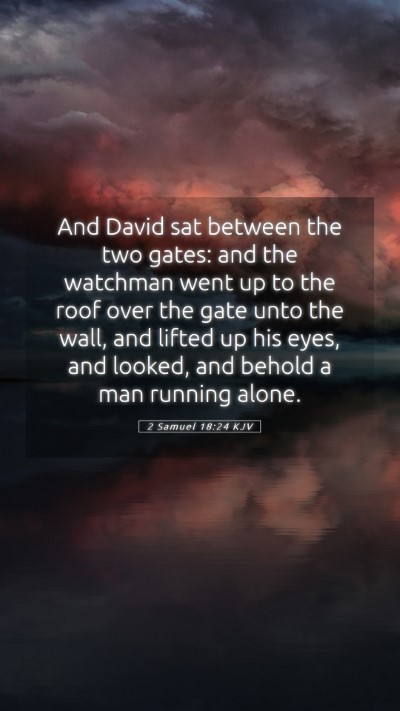Bible Verse Meaning: 2 Samuel 18:24
2 Samuel 18:24 states: "But David sat between the two gates: and the watchman went up to the roof over the gate unto the wall, and lifted up his eyes, and looked, and behold a man running alone." This verse presents a scene filled with emotion and anticipation in the life of King David during a critical moment in the narrative of his reign and the rebellion of his son Absalom.
Context and Overview
This passage occurs during the aftermath of a civil war within Israel, where David’s son Absalom has revolted against him. David, uncertain about the outcome and deeply concerned for both his kingdom and his family, positions himself at the gates, a place often denoting both physical and metaphorical boundaries.
Bible Verse Interpretations
-
Matthew Henry Commentary: Henry discusses David’s posture as a symbol of anxiety and vigilance. The gates serve as a metaphorical space where significant happenings unfold, implying that David was not just passively waiting but actively engaged in the uncertainties of leadership and familial strife.
-
Albert Barnes Commentary: Barnes highlights the significance of the watchman’s role and how the watchman’s sighting of the runner symbolizes the importance of information and communication in times of crisis. The act of running alone can signify the urgency of the news being brought.
-
Adam Clarke Commentary: Clarke notes that David's placement between the gates is indicative of his concern for both the safety of his kingdom and his familial ties. The imagery underscores the duality of David's current reality: as a king who is responsible for his people and as a father longing for the well-being of his son.
Key Themes and Symbolism
The themes of anxiety, anticipation, and duality are prominent in this verse. David's position can be viewed as representative of the stress and burden of leadership, especially in familial discord. The gates symbolize the boundary between security and the chaos that threatens to spill into his reign.
Moreover, the watchman's lookout elevates the need for watchfulness and discernment in times of turmoil, suggesting that knowledge and readiness are critical in times of conflict. The solitary runner signifies the isolated nature of those who bear news, reflecting both urgency and the personal cost of conflict.
Bible Study Insights
In studying this verse, significant insights can be drawn regarding the nature of leadership:
- Role of Communication: Just as the watchman plays a vital role in relaying crucial information, effective communication is key in any leadership.
- Emotional Turmoil of Leadership: Leaders often bear the weight of anxiety regarding their decisions and the well-being of their constituents.
- Importance of Vigilance: The necessity for constant alertness and readiness to respond to emerging situations is a lesson pertinent for both spiritual and secular leaders.
Application of the Verse
2 Samuel 18:24 offers valuable lessons applicable to modern readers:
- Understanding Personal Conflict: Just as David must confront the consequences of familial divisions, readers can reflect on personal relationships that may be in conflict.
- Leadership Under Pressure: This verse encourages individuals in leadership roles to be vigilant and prepared for challenges, emphasizing the importance of being proactive rather than reactive.
- Seeking Guidance: The leadership qualities exhibited here encourage prayerful consideration of one's decisions, seeking divine guidance in times of uncertainty.
Cross References
This verse can be related to several others in the Bible that expound similar themes:
- 2 Samuel 15:14: David's flight from Jerusalem, showing his immediate reaction to Absalom's rebellion.
- Psalm 55:5-8: David’s expression of deep anguish over betrayal, reflecting his troubled state.
- 1 Chronicles 19:14: The loyalty of David’s men and the importance of allies in times of distress.
Conclusion
The careful reading and interpretation of 2 Samuel 18:24 provide essential insights into the complexities of leadership, the emotions tied to family conflict, and the importance of vigilance and communication. As we study this verse and engage with its implications, it opens up avenues for deeper understanding of both historical contexts and personal applications in our own lives.


